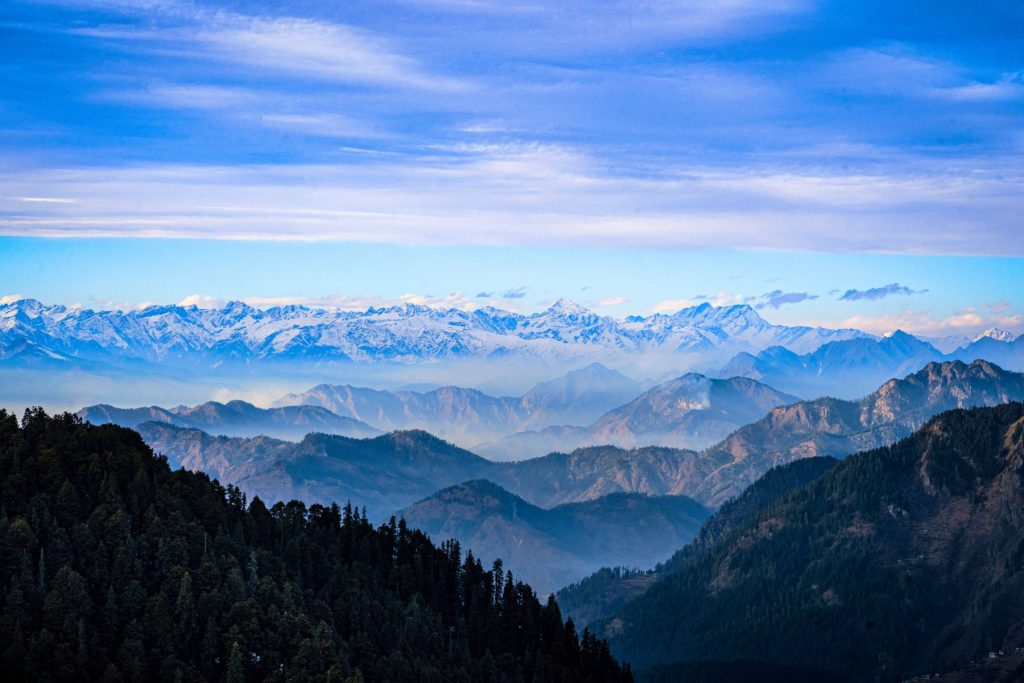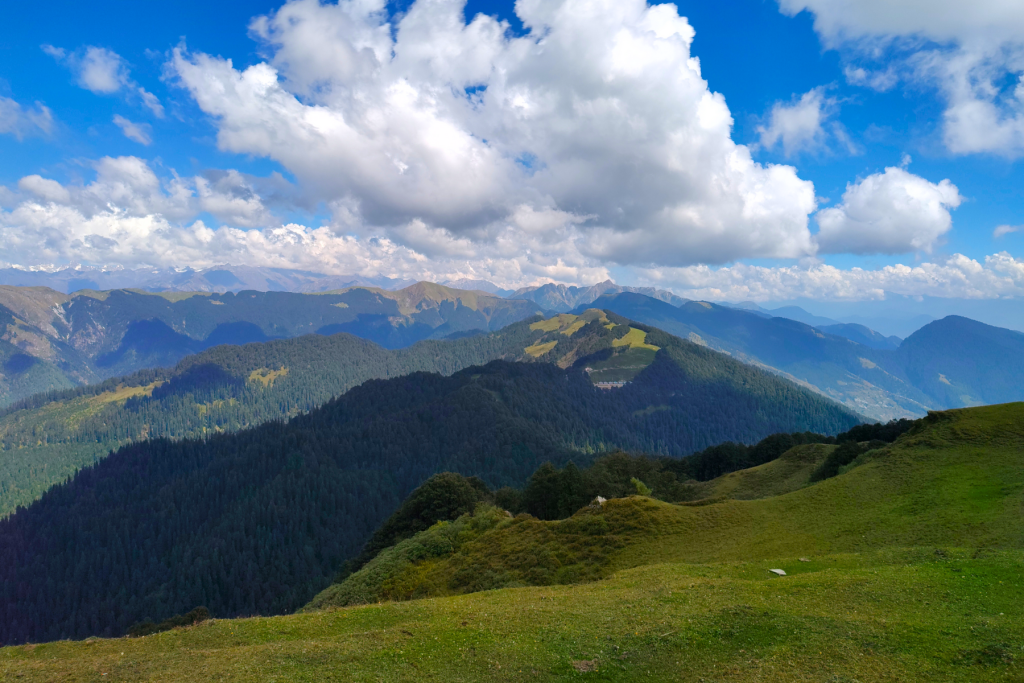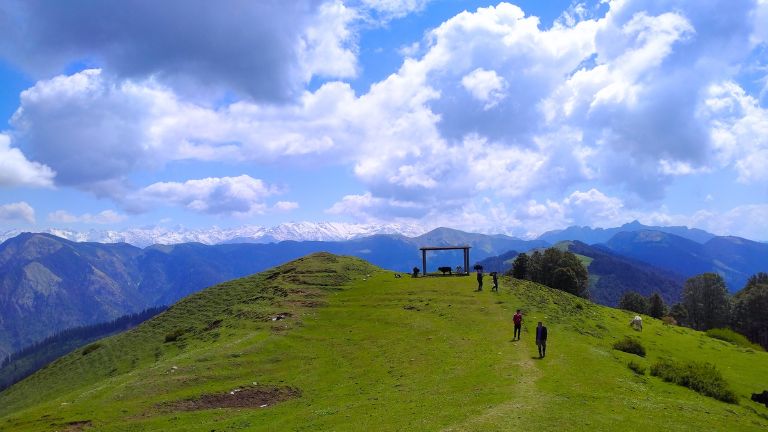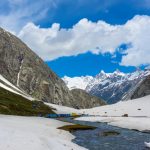If watching snow with family by your side, having a sporty trek in hills, or just enjoying Maggie after a refreshing cardio trek is your dream, the one marvelous trek to Jalori pass trek will fulfil your dream.
Jalori pass trek has gained popularity in recent years and have been popular among youngsters. They visit it when they are on way to Jibhi is a snowcapped village, with log cabin.
Jibhi trek begins from stunning Jibhi jalori pass, which attracts lot of tourists from all over the world for its geographical features.
So, fasten your seat belt, we are going to tour to Jibhi and Jalori pass, Himachal Pradesh.
- About Jalori Pass Trek:
- Geography, Culture & Its People:
- History of Jalori Pass Trek:
- Jalori Pass Highlights / Facts:
- How to Reach Jalori Pass:
- Jalori pass from Delhi:
- Jalori pass from Chandigarh:
- Weather in Jalori Pass:
- Jalori Pass Trek Short Itinerary:
- Jalori Pass to Serolsar Trek:
- Jalori to Raghupuragarh Fort:
- Things to Do in Jalori Pass:
- Jalori Pass Hotels:
- Jalori Pass Overview:
- Helpful Travel Tips:
- Permit:
- Conclusion:
- F&Q's Jalori Pass Trek
About Jalori Pass Trek:
Jalori Pass is a mountain pass , located near Kullu district of Himachal Pradesh; a beJibhiiful district near the village Jibhi which give vibe of old traditional Himachali village, and also of the Hollywood cabin in woods.
Situated at an elevation of approximately 10,800 feet (3,120 meters) above sea level, it gives giving view of the town and surrounding region.
It is a popular destination among trekkers; people get opportunity to view Seraj valley on their way to Jalori pass trek
Geography, Culture & Its People:
Jalori pass is endowed with mazing geographical features, trekkers on the Jalori pass trek come across various geographical features like bel valleys, snow-capped mountains, and dense Jungle.
People and culture on the contrary, is simple; there are ancient art, music, and dance forms yet practiced in the areas near the Jalori pass.
History of Jalori Pass Trek:
Jalori Pass has historical significance as it has been used as a trade route for centuries, connecting the Inner and Outer Seraj regions.
It has also played a role in various battles and conflicts in the past. Today, it stands popular as Jalori pass trek and adventure enthusiasts, providing them with an opportunity to explore the pristine Jibhi of the Himalayas.

Jalori Pass Highlights / Facts:
- On the Jalori Pass trek, trekkers encounter stunning views of the Dhauladhar and Kinnaur mountain ranges. At an elevation of 10,800 feet,
- Jalori Pass provides breathtaking views of the Dhauladhar and Kinnaur mountain ranges. The ice summits, delightful valleys, and the movement of sunshine on the mountains all contribute to a fantastic setting for visitors.
- It’s a trekker’s haven with numerous trekking paths going to calm places such as Serolsar Lake and Raghupuragarh Fort.
- It serves as the starting point for a variety of fascinating trek that lead to peaceful and Beautiful destinations like, the peaceful Jibhi and Serolsar Lake on the way to the Jalori Pass trek.
- You can explore the historic remains while taking in broad vistas of the surroundings on the trip to Raghupuragarh Fort, which in at 67 Kilometer distance from Jalori pass trek base camp.
- During the winter, there is so severe snowfall, that pass must be closed for trekkers, and always and only opens from May to November; although, it is never it is never recommended to visit Jalori Pass in July and August because Himachal Pradesh as state itself receives heavy rainfall.
How to Reach Jalori Pass:
Reaching on Jalori pass depends on the location you’re travelling from, two city which connect Jalori pass Himachal Pradesh is Delhi and Chandigarh, here are the following pathway you can follow: –
Jalori pass from Delhi:
The distance between Aut and Mandi is around 38 km. You can travel towards Delhi on the National Highway (NH) 3 or NH 205 from Mandi. 450 km separate Mandi and Delhi, and depending on traffic and road conditions, it often takes 8 to 10 hours to go that distance to reach Aut.
Then, descend towards Shoja settlement from Jalori Pass and continue travelling towards Aut from Shoja; depending on the state of the roads, the trip from Jalori Pass to Aut is around 35 kilometers and takes one to two hours.
Jalori pass from Chandigarh:
If the trekker planning the Jalori Pass trek is residing in Chandigarh, then they must start the trek by travelling on National Highway (NH) 205 from Chandigarh to Bilaspur Himachal Pradesh; continue on NH 205 from Bilaspur in the direction of Mandi; take the route leading to Aut after you arrive in Mandi.
It will take you approximately 250 km to reach Jibhi Jalori Pass Trek Base Camp, enrooting Jibhi. The distance from Jibhi to Jalori Pass is about 10 kilometers.
You will reach on time if the roads are better from Jibhi to Jibhi Jalori Pass, which entirely depends on the season you choose to visit.
Weather in Jalori Pass:
As trekker on knows, weather adds to the fun of trekking; you come across various vistas in Jalori pass Trek, complimenting weather in trek just makes your day on such tranquil location.
You not only reach on time during pleasant weather, but also benefit doing various other activities on the trek.
Here is the weather you encounter in each season in Jalori pass:

Jalori Pass Trek weather in summers (April to June)
From April to June, is pleasant and great for hiking. During this time, the daytime highs vary from 15 to 25 degrees Celsius, while the overnight lows can be as low as 5 to 10 degrees Celsius. Most of the days are sunny, providing clear views of the nearby mountains and valleys. The region’s lush vegetation, blooming flowers, and panoramic splendor are at their most beautiful during this time.
Jalori pass weather in Monsoon (July to September):
The monsoon season brings moderate to intense rain to Jalori Pass. Due to the slippery roads and potential for landslides, trekking during this time might be difficult. During the day, the outside temperature is between 12 and 20 degrees Celsius, while at night, it is between 5 and 10 degrees Celsius. Visibility is hindered by the frequent fog and mist.
Jalori pass weather in Autumn (October to November):
Autumn is excellent weather. The temperature at this time of year varies between 10 and 20 degrees Celsius during the day and between 0 and 5 degrees Celsius at night.
As the leaves change color, the surroundings can be seen in hues of red, orange, and yellow, which is pleasing to the eye.
Jalori pass weather in the winter (December to March):
Jalori Pass experiences a harsh and snowy winter. During this season, daytime temperatures often range from -10°C to 10°C, with overnight lows of -15°C or lower.
The area frequently receives a lot of snow, making it look like a winter wonderland. Due to the difficult conditions, sometimes winter trekking is risky, so the government might close the trekking area due to hazardous winter conditions on the pass.
Jalori Pass Trek Short Itinerary:
Ok now you have chosen the weather, now learn the best itinerary for Jalori pass trek to follow. Follow our recommended itinerary to enjoy the fullest:
Day 1: Acclimatization on Arrival in Jibhi:
Upon arrival in Jibhi, take some time to acclimatize to the altitude and relax. Explore the beautiful surroundings and get accustomed to the peaceful ambiance around the cozy stay in Jibhi.
Day 2: Jibhi to Jalori Pass Trek enroute Serolsar Lake:
Start the day with a calm long drive from Jibhi to Jalori Pass, begin your trek towards Serolsar Lake – the crystal-clear lake near Jalori pass; The Serolsar trek will take you through a dense forest, offering glimpses of the amazing mountain vistas and ofcourse, positive and tranquil atmosphere near the Serolsar lake.
Afterwards, walk in the woods of Jibhi and spend some good time with the local.
Day 3: Trek to Raghupuragarh Fort:
Begin your trek from Jibhi back to Jalori Pass. From Jalori Pass, embark on Raghupuragarh Fort Trek through beautiful landscapes, including forests and meadows, while enjoying view of the valleys.
Remember, the trek will test your endurance, as Raghupuragarh Fort is situated on the hilltop; Moreover, Fort being one of mentions in ancient text will leave you awestruck when it takes back in time.
Afterward, trek back to Jalori Pass, it time to retreat to a your hotel.
Day 4: Raghupuragarh Fort to Jalori Pass:
It is now departure time, say bye to the beautiful landscape enrooting Jibhi, trek from Raghupuragarh fort back to Jalori Pass, enjoy nostalgic photo-session to carry some memories way back to home.

Jalori Pass to Serolsar Trek:
Follow the following plan for Jalori pass to serolsar Trek comes in
- Start the trek from Jalori Pass and descend through dense forests.
- The trail passes through oak and pine forests, offering captivating views of the surrounding mountains.
- After a trek of approximately 5 kilometers, you’ll reach the mesmerizing Serolsar Lake, known for its crystal-clear waters.
- Spend some time enjoying the serene surroundings and then retrace your steps back to Jalori Pass.
Start your journey from Jalori Pass, descending through thick woodlands that surround the path. You will get to see vistas of the nearby mountains as you travel through oak and pine forests, in a tranquil and soothing atmosphere.
You will arrive at the ethereal Serolsar Lake with its crystal-clear waters after travelling around 5 kilometers; take a moment to enjoy the peaceful surroundings. After taking in the calm atmosphere, make your way back to Jalori Pass while holding onto the memories of your entrancing adventure.
Jalori to Raghupuragarh Fort:
- Follow the following plan to get out of the Jalori pass to Raghupuragarh Fort trek:
- Start the trek from Jalori Pass and descend towards the valley.
- The trail takes you through thick forests and small villages, providing glimpses of the local culture.
- After trekking for around 4 kilometers, you’ll reach the Raghupuragarh Fort, an ancient fort perched on a hilltop.
- Explore the fort and its ruins, and enjoy panoramic views of the valley.
- Return to Jalori Pass following the same route.
The second part of the trek commences from Jalori Pass, leading you on a descent towards the valley below, goes through thick forests and small villages, offering glimpses of the simplistic local culture that adds an enriching dimension to your journey.
As you trek for approximately 4 kilometers, the historic Raghupuragarh Fort emerges on the horizon, at the top of the hills. Enjoy the broad vistas from the above.
Things to Do in Jalori Pass:
The journey to Jalori Pass offers an array of captivating activities to indulge in:
Trip to Serolsar Lake:
Set off on a charming trip to Serolsar Lake and enjoy the serene surroundings and the lake’s crystal-clear waters.
Visit Raghupuragarh Fort to immerse yourself in history while taking in the expansive vistas of the surrounding valleys and mountains.
Camping:
By pitching a tent in Jalori Pass, you can take advantage of the enchantment of the starry sky and the tranquil surroundings.
Bird Watching:
Take pleasure in the area’s variety of avian residents, which make it a sanctuary for aficionados.
Photography:
Use your camera to capture the mesmerising scenery, grand mountain panoramas, and dynamic local culture.
Nature Walks:
Take leisurely walks around Jalori Pass, allowing you to marvel at the diverse flora and fauna of the region.
Enjoy Local Cuisine:
Treat your taste buds to the traditional Pahadi cuisine, relishing local delicacies like siddu, kadhi, and kheer.
Interact with Locals:
Immerse yourself in the warm hospitality and friendly demeanor of the locals, gaining insights into their unique culture and way of life.
Visit Waterfalls:
Explore nearby waterfalls like the enchanting Chehni Kothi Waterfall, adding to the natural beauty of the region.
Relax and Rejuvenate:
Savor quiet moments amidst nature, experiencing the tranquility and serenity that Jalori Pass graciously offers.
Jalori Pass Hotels:
(Note: These are examples of top-rated hotels according to Google reviews, as of my knowledge cutoff in September 2021. It’s recommended to check for the latest information and availability.)
The Wilderness (Jibhi):
Located in Jibhi, this hotel offers comfortable accommodation with beJibhiiful views of the surrounding mountains. Basic amenities include clean rooms, attached bathrooms, hot water, and a restaurant. It is situated in close proximity to Jibhi Market.
Tirthan Valley Eco Resort (Banjar):
Situated in Banjar, near Jibhi, this eco-friendly resort provides a peaceful retreat amidst nature. The resort offers cozy cottages equipped with modern amenities, a restaurant serving local and international cuisine, and outdoor activities like fishing and hiking.
The Himalayan Trout House (Gushaini)
This is a hotel that offers cosy accommodations with lovely views of the Tirthan Valley. It is situated in Gushaini. It offers standard amenities, including spotless rooms, private toilets, hot water, and a restaurant providing delectable regional cuisine. The Tirthan River is not far from the motel.
Jalori Pass Overview:
Jalori Pass trek is a mountain pass in Himachal Pradesh, offering a perfect blend of natural adventure, and cultural experiences. The trek to Serolsar Lake and Raghupuragarh Fort provides an opportunity to explore the mesmerizing landscapes and immerse yourself in the local culture.
With its pleasant weather and breathtaking views, Jalori Pass is a must-visit destination for nature lovers and adventure enthusiasts.
Helpful Travel Tips:
1. Carry sufficient warm clothing, especially during the winter months, as the temperature can drop significantly. Layering your clothing is recommended to adjust to different temperatures throughout the trek.
2. Stay hydrated and carry a water bottle during the trek to avoid dehydration. It’s essential to drink an adequate amount of water to keep yourself hydrated, especially at higher altitudes.
3. Pack comfortable trekking shoes, sunscreen, sunglasses, and a hat to protect yourself from the sun. Good-quality trekking shoes will provide support and grip on uneven terrains, while sunscreen, sunglasses, and a hat will shield you from the sun’s rays.
4. Snacks and energy bars should be brought along for the walk. These lightweight snacks will keep you satisfied on extended treks and provide you a fast energy boost.
5. Obtain any permissions or permits required for the area’s trekking. It’s crucial to check local laws and collect the required paperwork in advance because some trekking routes or locations can require specific permits for admission.
6. Comply with your trekking guide’s advice and show respect for regional traditions and customs. Your trekking guide will offer insightful advice, protect your safety, and aid in efficient route navigation. Respecting the regional culture and traditions will foster effective communication with the neighborhood.
7. During the walk, make sure to manage waste properly and keep the area clean. Bring a small trash bag with you and pack up any garbage you produce while hiking. Keep the area’s natural beauty intact for future hikers by leaving no traces.
You may improve your trekking experience, keep yourself secure and comfortable, and support the preservation of the environment and regional culture by heeding some practical travel advice.
Permit:
No special permits were needed to hike to Jalori Pass as of my knowledge’s cutoff date of September 2021. For the most recent information on licences or permissions, it is always advised to consult with regional Jibhi officials or tour guides.
Conclusion:
The beautiful location of Jibhi, Himachal Pradesh’s Jalori Pass Trek, offers an unforgettable trekking adventure. For those who enjoy the outdoors and seek adventure, Jalori Pass is the ideal vacation destination because of its beautiful scenery, extensive cultural history, and range of activities. To make your trip truly unforgettable, explore the tranquil Serolsar Lake, the historic Raghupuragarh Fort, and revel in the local culture.
F&Q’s Jalori Pass Trek
1. How challenging is the trek to Jalori Pass?
The Jalori Pass walk is regarded as being of intermediate difficulty, making it appropriate for both novice and seasoned hikers.
2. Is the walk to Serolsar Lake challenging?
All levels of hikers can enjoy the Serolsar Lake walk because it is quite simple.
3. What is the height of the Jalori Pass trek?
The height of the Jalori Pass trek is approximately 3,120 meters (10,240 feet) above sea level.
4. How long is the Tirthan trek?
The duration of the Tirthan trek can vary depending on the specific route and destination, but it typically ranges from a few days to a week or more.








